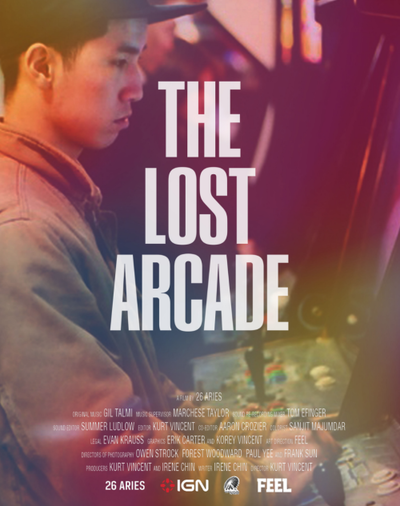By Marshall Garvey
What was the arcade you loved? More specifically….what was the one you lived as well as loved? The place where you spent a GDP level of quarters, where friendships began and ended with rivalries at fighting games, where everyone came to marvel at the local king of Street Fighter, where the cooing blips and bloops of Pac-Man, Centipede and Donkey Kong created a rapturous 8-bit symphony until the wee hours of the morning. Perhaps it’s still functioning…or, like most vintage arcades, it functions only in your memory.
For scores of people across racial and ethnic lines in New York City, Chinatown Fair was that place…and more. A true hole-in-the-wall located in the thick of Chinatown in Manhattan, 8 Mott Street. It was a video game arcade in the purest sense, devoid of a bar, food court or any other amenities to widen its audience. It was for only the true souls of gaming, the types for whom a victory at Marvel vs. Capcom was an affirmation rather than a mere escape. The Lost Arcade, a 2015 documentary by filmmakers Kurt Vincent and Irene Chin, set out to capture the hallowed playground’s heyday, as well as its sudden closure.

The first section of the film is a cursory history of Chinatown Fair. Like many video game entities, its life began as something else entirely. Commencing operation as a penny arcade in the ’40s, the Fair was known primarily for attractions like a dancing chicken. (Later replaced by one that played tic-tac-toe.) In 1982, it was purchased by Pakistani immigrant Sam Palmer after a “religious” dream in which he saw an endless cascade of quarters. Promptly revamped with contemporary video game cabinets, it assumed its best known incarnation just as video games began to ascend.
From the outset, Chinatown Fair was overshadowed by the hive of arcades that unsurprisingly set up shop and initially thrived in Times Square. But then a funny thing happened: one by one, those arcades steadily died out, leaving the Fair as the last true hive for devout gaming enthusiasts. It also became a de facto home for a cast of doggedly loyal customers and employees, whose stories of how they became fastened to the Fair provide the documentary’s emotional core. Most touching is that of Akuma Hokura, a former foster/homeless child who found both employment and home in Palmer’s dream arcade. (Not revealing his actual name, he endearingly goes by the same moniker as a Street Fighter character.)
The arcade developed an outsized reputation that exceeded the niche world of fighting games. Robert De Niro and Meryl Streep filmed a scene from their 1984 movie Falling In Love there. Ol’ Dirty Bastard even used its lived-in confines as a backdrop for the music video of his 1995 song “Brooklyn Zoo.”
https://www.youtube.com/watch?v=PCeDZAf3OyY
Of course, even with entries into wider culture and cadre of loyal patrons, the fun could only last so long. The proliferation of home consoles in the ’90s led to many arcades shuttering their doors, although the hole in the wall on Mott Street managed to extend its life all the way until 2011. Just over a year after its last night as the realization of Palmer’s religious dream, Chinatown Fair reopened in mid-2012 under the ownership of Lonnie Sobel.
Such a swift rebirth should, ostensibly, have been a miraculous development for all of the arcade’s followers. But old denizens like Akuma found its new iteration to be too much like a Dave and Buster’s. He and other former employees migrated to a new Brooklyn location called Next Level, hosting regular fighting game tournaments to carry on their former home’s spirit.
The Lost Arcade succeeds in telling a story that, at face value, has a straightforward nostalgic appeal. With the death of arcades only expedited the past two decades, the film hits the sweet spot of yearning for a simpler time. Had it been just a predictable lamentation of the passing of a bygone era, it would have worked just fine in that vein. Featuring many atmospheric shots of the Fair saturated with an ambient soundtrack, The Lost Arcade makes one feel like they’ve always loved the place even if they had never heard of it until watching.
However, that would have been the easy and predictable route. The film also wisely celebrates the present and future of the Fair and modern gaming communities. Even after showing Akuma and others’ disappointment at Chinatown Fair’s new direction, there is equal time dedicated to showing new customers religiously plugging away at its Dance Dance Revolution machine. Even as one part of the establishment’s life comes to an end, its spirit of forging bonds through competitive gaming finds a new incarnation.
The greatest strength of the film is how much it captures the inherent humanity of gaming culture. As someone who grew up far more on consoles than arcades, watching it made me appreciate the importance of human connection, a special kind of which only an arcade can create. One of the best of these moments highlights a place in Barbados that provides Nintendo and Sega consoles and games to poor children who otherwise would never experience them. It makes one not only appreciate the relative comfort most gamers enjoy, but realize the sadness of a life without them.
The Lost Arcade marks another stellar installment in the growth of video game documentaries, and a fitting corollary to the outstanding World 1-1 (also released in 2015). Those who lived in arcades will revel in its sincere, nostalgic paean to those hallowed grounds and the deep bonds of friendship and sanctuary they provided. All the same, those who live for current gaming scenes like fighting tournaments will appreciate its commensurate recognition of the present and future of how people publicly bond over video games.
The Lost Arcade Official Website
Official Trailer
